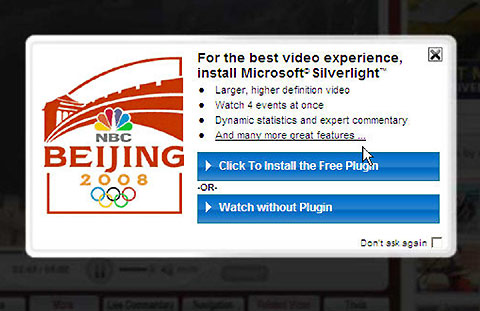SEATTLE - As the world's best athletes compete in Beijing, the summer Olympic games are setting the stage for a battle between Microsoft Corp and Adobe Systems Inc over the Internet's next big competition.
 |
|
A pop up window on NBC.com for installing Microsoft's Silverlight technology to view online videos from the summer Olympics is shown in this screen grab August 22, 2008. As the world's best athletes compete in Beijing, the summer Olympic games are setting the stage for a battle between Microsoft Corp and Adobe Systems Inc over the Internet's next big competition. [Agencies]
|
Microsoft's Silverlight technology and rival Adobe's Flash format are currently locked in a race over who delivers the world's online video, but the ultimate prize may be who powers the next generation of Web software.
Using Silverlight, the NBC site offers a glimpse of what is possible with future Web applications because viewers are able to watch up to four videos at once or follow the action with an online commentary that runs alongside the video.
More than 40 million US viewers have gone to NBC's Olympics site to watch some of the 2,200 hours of live footage from the Beijing games. All those viewers need is a Silverlight player on their browser if they do not have one already.
By building up Silverlight's user base, the world's largest software maker is looking to win over developers who see Web platforms such as Silverlight and Flash as a new way to deliver powerful Web-linked programs incorporating rich graphics.
Currently, those platforms are mainly reserved for multimedia applications such as Google Inc's popular YouTube site, which runs on Adobe's Flash technology.
"It's quickly becoming a very popular way to build next generation applications. There's a lot of interest in capturing the hearts and minds of developers," said Jeffrey Hammond, an analyst at Forrester Research. "It'll be a big business."
Microsoft, which said nearly half the visitors to NBC's site did not have Silverlight, plans to expand its reach to close the gap on Flash, which is already running on most of the world's Web-connected computers and powers over 80 percent of the video on the Internet.
For Microsoft, keeping outside developers loyal is especially important at a time when there is a major shift in how people buy software.
After years of selling licenses for software that runs on a computer's hard drive, Microsoft is facing a new batch of competitors providing software free as a service through the Web browser in exchange for online advertising.
Taking advantage of Flash, Silverlight and other more simple Web-coding technologies such as AJAX, a new breed of interactive Web software -- known as rich Internet applications (RIAs) -- has emerged.
Like other Web applications, RIAs are cheaper to deploy and maintain than traditional software, but they differ from more simple Web programs by employing rich graphics, running faster and creating a seamless experience that does not require the application to constantly reload or refresh.